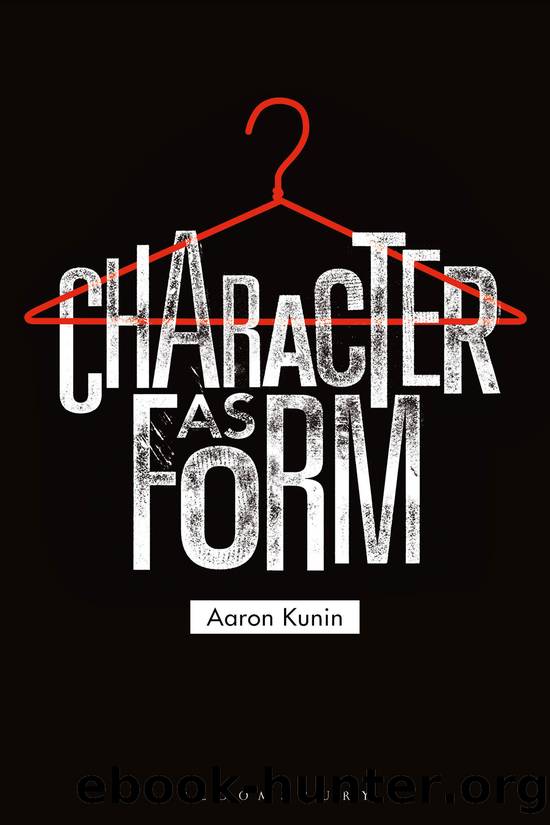Character as Form by Aaron Kunin

Author:Aaron Kunin [Kunin, Aaron]
Language: eng
Format: epub
Tags: Literary Criticism, General, Comparative Literature, Semiotics & Theory
ISBN: 9781474222686
Google: v_GEDwAAQBAJ
Publisher: Bloomsbury
Published: 2019-03-07T20:45:16+00:00
3What fiction means
Decorum or discretion?
The subtitle of The Importance of Being Earnest is: âA trivial comedy for serious people.â If I understood the meaning of this generic description, I would know everything there is to know about Wilde.
Donât I already understand? The meaning seems straightforward enough. Comedy is trivial in the sense of frivolous. It offers a bit of momentary fun. If it fails to improve the people who are its audience, at least it does not put them in actual danger. People are serious because they take themselves seriously. They exist for themselves, not for something else. In that case, the two modifiers are redundant for the strangely unsettling phrase: âA comedy for people.â This abbreviation only emphasizes the redundancy. âFor peopleâ as opposed to what? Bears? Ghosts? Why not simply say: âA comedyâ? What could be more human than that?
The unsettling implication of these descriptions is that they are not redundant. Some people are not serious, just as âsome aunts are not tallâ (The Importance of Being Earnest, 1.145â46). Some comedies are not for people, and some are not trivial. In declaring a genre and a species, the subtitle seems to refer to unexplored modes of the comic and to unachieved visions of humanity. The parallel construction implies that these categories are opposite ends of a spectrum, but I am not ready to say that a nontrivial comedy would be a serious one. (Is triviality opposed to seriousness? In a line spoken just before the final curtain, Jack, now called Ernest, implies that the opposite of triviality is importance, which may not be the same thing.)
The parallel construction may have another meaning if its form is identical to the playâs distinctively shiny, funny talk. Although there are several kinds of people in Earnest, there is only one kind of talk. Wilde formalizes talk to the extent that every character talks in the same voice, which is Wildeâs own voice. A figure of speech such as parallelism, which in most circumstances would be a stylistic choice, in this community is a formal principle with the same status as the alexandrine couplet in Racine. Algy treats his share of the playâs talk as an element of personal style in an appreciative comment on the phrasing of one of his own lines, but neglects to observe that every line spoken in the play, clever or not, trivial or not, is equally âperfectly phrasedâ (1.608). The capacity of Wildeâs voice to assimilate details of plot and psychology as well as rhetorical figures is shown by the tendency in the third act for Gwendolen to speak in unison with Cecily, and Jack with Algy. The characters of Jack and Algy are highly distinct, but their talk does not differentiate themânot a bad trick in such a talky play. A better tool for differentiating them might be the idea of seriousness, but, as I have started to indicate, this idea has its own difficulties.
In his wonderful essay âWhat Does Jamesian Style Want?â David Kurnick
Download
This site does not store any files on its server. We only index and link to content provided by other sites. Please contact the content providers to delete copyright contents if any and email us, we'll remove relevant links or contents immediately.
The Power of Myth by Joseph Campbell & Bill Moyers(1045)
Half Moon Bay by Jonathan Kellerman & Jesse Kellerman(976)
Inseparable by Emma Donoghue(968)
A Social History of the Media by Peter Burke & Peter Burke(965)
The Nets of Modernism: Henry James, Virginia Woolf, James Joyce, and Sigmund Freud by Maud Ellmann(888)
The Spike by Mark Humphries;(797)
The Complete Correspondence 1928-1940 by Theodor W. Adorno & Walter Benjamin(770)
Culture by Terry Eagleton(766)
A Theory of Narrative Drawing by Simon Grennan(766)
Ideology by Eagleton Terry;(728)
World Philology by(709)
Farnsworth's Classical English Rhetoric by Ward Farnsworth(702)
Bodies from the Library 3 by Tony Medawar(699)
Game of Thrones and Philosophy by William Irwin(697)
High Albania by M. Edith Durham(690)
Adam Smith by Jonathan Conlin(683)
A Reader’s Companion to J. D. Salinger’s The Catcher in the Rye by Peter Beidler(670)
Comic Genius: Portraits of Funny People by(641)
Monkey King by Wu Cheng'en(639)
